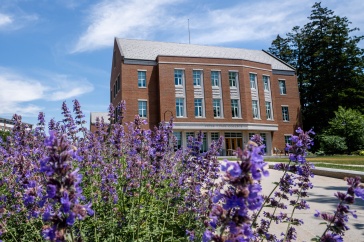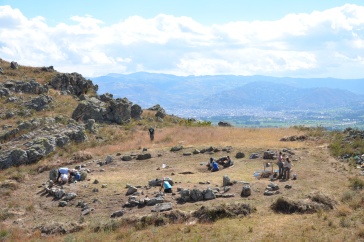
Brig. Gen. Peter Corey ’83 has been deployed to many places in the world that are dangerous for various reasons — but perhaps none gave his family as much pause as when he left for Liberia last October.
The deputy commanding general for U.S. Army Africa, Corey spent much of the fall in Monrovia, leading U.S. Army troops helping in the effort to stop the spread of Ebola. An advance team, Corey’s unit constructed a 25-bed hospital to treat infected healthcare workers and established two mobile medical labs to facilitate quicker diagnosis of the deadly disease and multiple Ebola treatment units for those workers who are really on the frontlines—the doctors and nurses fighting the country’s Ebola outbreak.
Corey says the good news is that there are people who are getting better. “There are people being healed and being able to go back to their families,” he says. “It’s perhaps equally exciting but less dramatic [than the bad news]: folks do get cured and get to return home.”
Stationed in Liberia in 2006-2007 as part of a U.N. peacekeeping mission, Corey arrived well versed in what has proven to be the biggest challenge in getting on top of the spread of Ebola: the lack infrastructure throughout the country. Since emerging from civil war in 2003, Liberia has struggled to rebuild government institutions and services that Americans might take for granted.
“There is no power grid, no reliable water, no sewage treatment system,” he says. “What little infrastructure there is, you might see in the capital city, but it’s really nonexistent beyond that. There are very few paved roads, and those that are paved are in a state of disrepair. The health system is fragile, the security system is fragile.” Unfortunately, he says, the progress that has been made since 2003 is taking a heavy hit from the Ebola outbreak.
Still, he notes that the dramatics of the day-to-day life in Liberia and other hot zones may be overplayed in the American media. “You don’t see bodies lying in the street, or dazed people wandering aimlessly, but they know it’s certainly very serious. Whole families have been wiped out, some villages have lost sizable percentages of their population.”
Liberia was not Corey’s first turn at humanitarian assistance disaster response. As director of the N.H. National Guard’s joint staff, he was the commander for New Hampshire’s response to Hurricane Katrina in 2005, leading 400 New Hampshire National Guardsmen in New Orleans. It’s quite a departure for the plant biology major who enrolled at UNH with visions of a career in agriculture or botany—not the military. He joined the UNH ROTC program, he says, following in the footsteps of his father a 40-year guardsman, and quickly found that it inspired the sense of teamwork and selfless service that led him to his current path.
It was also at UNH that Corey met his wife, Margaret, whom he married not long after their 1983 graduation. The Coreys’ children have continued the UNH tradition—daughters Kerstin and Dana graduated in 2011 and 2013, respectively, and son Joseph is a member of the class of 2016.
Corey acknowledges that the entire family was somewhat nervous about his Liberia mission, even knowing that he was not going to be in direct contact with infected citizens. “But everyone got over his or her initial concern,” he says. “They appreciate what I do, and they are all very supportive.”
Corey’s deployment ended in mid-November with a precautionary quarantine. Today, he is back in New Hampshire, watching the work of his advance detachment bear fruit from afar. Their lab facilities have dramatically accelerated the testing of patient samples, according to the Department of Defense, and the sustainment base his unit built for the ongoing Operation United Assistance is in full service with the international healthcare teams still on the ground in Liberia.
“If you could sit down and see what’s been accomplished, it would be mindboggling,” he says. “This really speaks to the capabilities of the U.S. military being able to quickly mobilize resources and get things done.”
Originally published in UNH Magazine—Winter 2015 Issue
-
Written By:
Michelle Morrissey ’97 | UNH Magazine | michelle.morrissey@unh.edu
















































